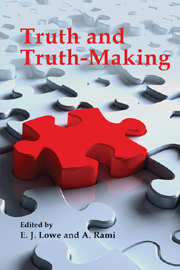Book contents
- Frontmatter
- Contents
- Preface
- Contributors
- 1 Introduction: truth and truth-making
- Part I Setting the stage
- 2 Truth and the truth-maker principle in 1921
- 3 Truth-makers
- 4 Truth-makers, entailment and necessity
- 5 Postscript to “Truth-makers, entailment and necessity”
- 6 Truth-making and difference-making
- 7 The general theory of truth-making
- Part II The current debate
- Bibliography
- Index
6 - Truth-making and difference-making
from Part I - Setting the stage
- Frontmatter
- Contents
- Preface
- Contributors
- 1 Introduction: truth and truth-making
- Part I Setting the stage
- 2 Truth and the truth-maker principle in 1921
- 3 Truth-makers
- 4 Truth-makers, entailment and necessity
- 5 Postscript to “Truth-makers, entailment and necessity”
- 6 Truth-making and difference-making
- 7 The general theory of truth-making
- Part II The current debate
- Bibliography
- Index
Summary
The truth about truth, so far as propositions are concerned, is a long but simple story. A proposition is true iff
it is the proposition that a donkey talks, and a donkey talks; or
it is the proposition that pigs fly, and pigs fly; or
it is the proposition that cats purr, and cats purr; or
it is the proposition that servitude to the state is perfect freedom, and servitude to the state is perfect freedom; or …
So we have the familiar biconditionals – trivial, necessary, and knowable a priori –
the proposition that a donkey talks is true iff a donkey talks;
the proposition that pigs fly is true iff pigs fly;
the proposition that cats purr is true iff cats purr;
and so on, for all the propositions there are.
Not for all the ‘that’-clauses there are. Some ‘that’-clauses fail to name propositions: for instance because of ungroundedness, or because the embedded sentence is a mere expression of feeling in the syntactic guise of a declarative sentence. Further, some propositions cannot be named by ‘that’-clauses. First, because there is an uncountable infinity of propositions, whereas there are only countably many ‘that’-clauses. Second, because some of the propositions, in fact most of them, cannot be named by ‘that’-clauses of finite length. Third, because some propositions cannot be named at all, not even at infinite length, since we lack names for alien properties that are nowhere to be found in our actual world, and that cannot be reached by any sort of construction or extrapolation or interpolation from this-worldly properties.
- Type
- Chapter
- Information
- Truth and Truth-Making , pp. 102 - 114Publisher: Acumen PublishingPrint publication year: 2008
- 1
- Cited by

